African Marine Solutions (AMSOL) is a South African company with an association with the famous Dutch salvage and ocean towing company Smit, founded in Rotterdam (Netherlands) in 1842.
The South African origin of the company dates back to the 1970s when Safmarine (then South Africa’s largest shipping company) formed Saftug to own and operate two large and powerful salvage tugs as emergency towing vessels on the South African coast. One of those tugs, SA Amandla (registered in 1977 as SA John Ross) is still in service and during her 40 years’s service has undertaken numerous remarkable towing and salvage operations.
In 1986, Saftug joined with another South African company, Land & Marine Salvage, to form Peninsula Towing (known as Pentow Marine), in which Safmarine and the construction company Murray & Roberts, each owned 50 percent share.
After the restructuring of the company in 1999, Smit bought a majority share and later took full control of the South African operation. A South African company, Smit Amandla Marine was formed in 2004 to operate the emergency towing vessel contract that the company has held (via its predecessor companies) since 1977. AMSOL acquired the business of SMIT Amandla Marine in December 2016.
The local team of salvage experts has a remarkably successful record, including the operation, involving two big tugs, that led to the safe delivery of the ULCC Mimosa that was immobilised during a storm off the Eastern Cape coast in August 1991. She went beam-on to the heavy swell and cracked. The tugs towed her to the safety fo Algoa Bay where her cargo was transferred to a sistership. Thereafter Mimosa was towed to Dubai for repairs.
When the heavylift ship Mighty Servant 3 sank in over 60 metres of water off Luanda, a Smit team from Cape Town undertook the task of refloating her. And the company has been involved in many more successful salvage operations.
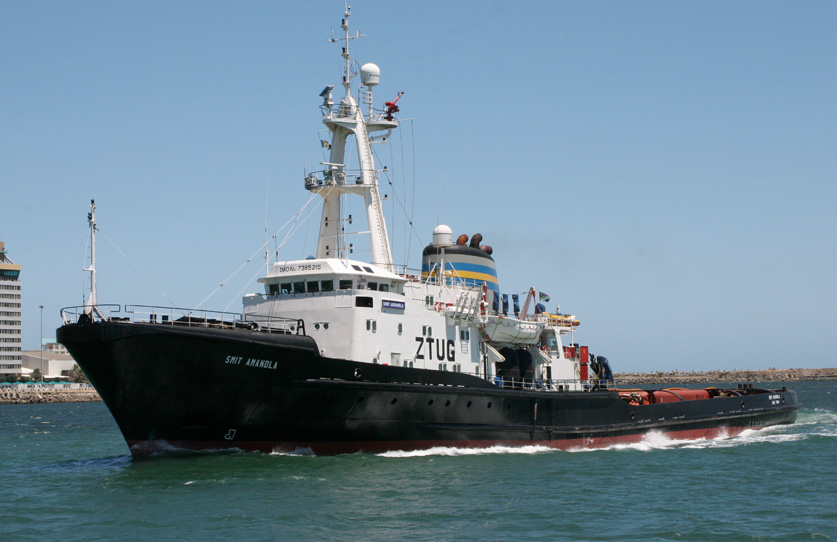
The salvage tug SA Amandla that has undertaken numerous salvage and ocean towage operations in her nearly-40-year career.
Over the years, the company has broadened its operations to include ship bunkering, for which purpose it operates two bunker barges in Durban and one in Richards Bay where they deliver marine fuels to vessels in port.
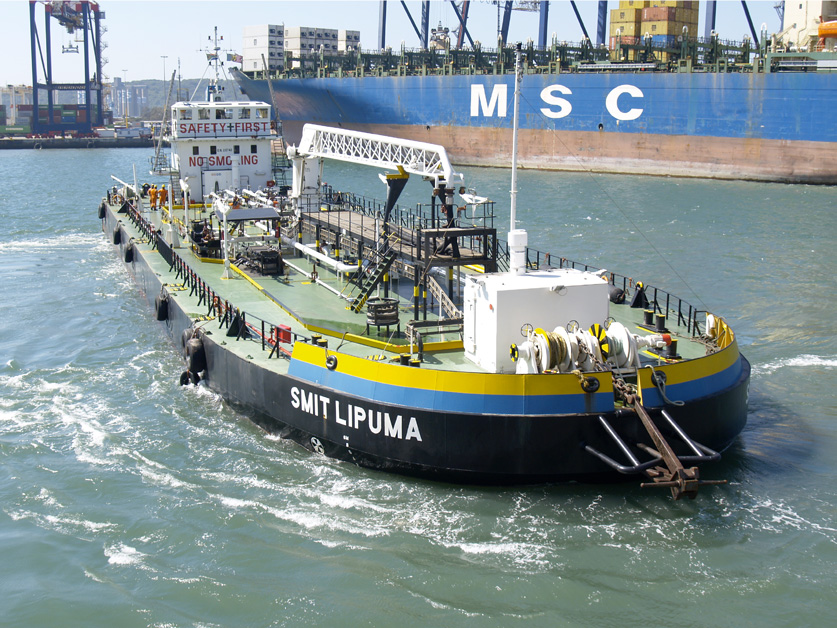
Bunker barge Lipuma in Durban harbour. The white crane-like equipment on the foredeck contains the pipe to connect the barge to the ship’s bunker manifold. Photograph: African Marine Solutions (AMSOL)
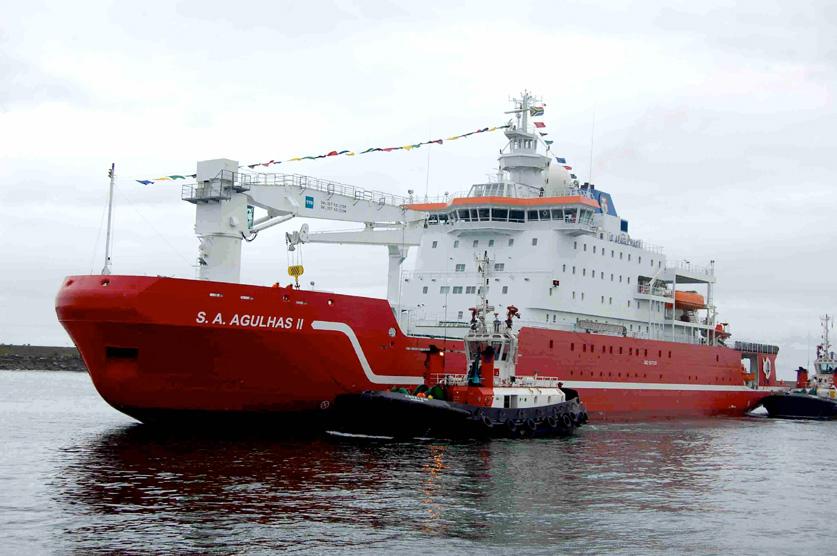
Ship management is another of the services that African Marine Solutions (AMSOL) offers to its clients. Among the vessels managed and crewed by the company is the South African polar supply and research vessel SA Agulhas II. Photograph: Robert Pabst
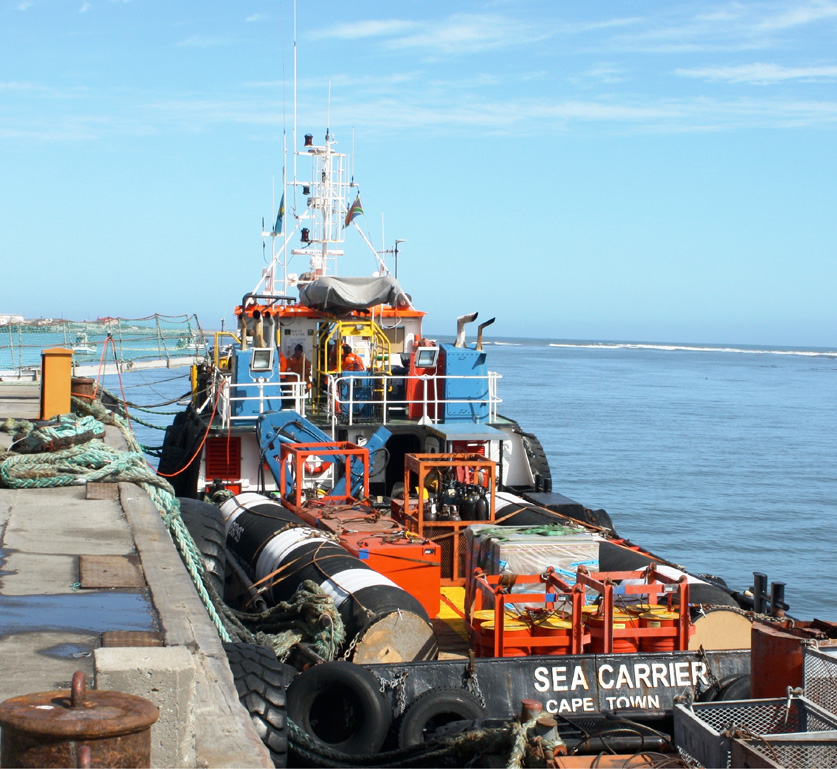
The supply vessel Sea Carrier alongside the jetty at Port Nolloth on South Afirca’s west coast. She and her sistership Sea Express carry supplies to the offshore diamond recovery vessels that operate in the area. On her afterdeck are the supplies and equipment ready for delivery to one of the diamond vessels. The ships and the contract to service the diamond vessels are managed by African Marine Solutions (AMSOL). Both vessels will be replaced shortly by new ships, built by eh Damen Shipyard in Cape Town. The first of these vessels was delivered to African Marine Solutions (AMSOL) in November 2015. The second vessel was due to follow in early 2016.
It’s not only damaged ships that require the services of experts in ship-to-ship transfers of liquid cargoes. Occasionally part-cargoes need to be transferred so that the cargo can be delivered to a port more economically or more quickly. While this can be done in a sheltered bay (e.g. Algoa Bay or St Helena Bay, South Africa), they can also be done in port with ships double-banked or berthed across a jetty and linked by heavy-duty hoses for the transfer of the liquid. An example of such an operation involved the transfer of a cargo of ships’ fuel from the tanker STI Amber to another tanker Atlantic Breeze in Walvis Bay, Namibia:
Contracted to manage a ship-to-ship transfer of a cargo of fuel between the tankers STI Amber and Atlantic Breeze. a specialist team was mobilised from Cape Town to Walvis Bay to undertake this high-risk operation. Under instruction from local authorities, the transfer took place off port limits [this means outside the area controlled by the port]. Mooring Masters in the team safely piloted both vessels alongside each other. After 15 hours of pumping, 12 000 tons of cargo fuel were transferred from Atlantic Breeze to the STI Amber. The two vessels were then safely unmoored from each other and Atlantic Breeze continued her voyage along the South African coast, while STI Amber entered Walvis Bay port to discharge her cargo.
Ship-to-ship bunkering operations at sea have also been done.
The company has manages several ship-to-ship bunkering operations, one of which took place north of Robben Island, off Cape Town. A Smit team undertook the ship-to-ship transfer of marine gas oil (MGO – a form of diesel) from the tanker Wappen von Bremen to the drillship Discoverer America’, followed by the transfer of base oil from the Platform Support Vessel ‘Far Scotsman to the drillship.
In five hours, 400 cubic metres of base oil was transferred to the drillship. When Far Scotsman (the tug accompanying the drillship) returned to Cape Town for a crew change, Discoverer Americas remained in position ready for the MGO transfer.
The weather remained poor but the next day, in improved conditions, Wappen von Bremen was safely moored alongside the drillship. After 28 hours of pumping, 3800 cubic metres of MGO was transferred from Wappen von Bremen to Discoverer Americas.
After the operation, Wappen von Bremen safely unmoored from Discoverer Americas and continued with her usual coastwise operations along the South African coast. Discoverer Americas continued with her crew change and taking stores in preparation for work off Mozambique.
Safety of the team and of the ships involved as well as environmental protection are extremely important in these ship-to-ship operations.
The company also operates in Mozambique where, among other roles, African Marine Solutions (AMSOL) provides towing services at the port of Beira where lighters loaded with coal are towed to ships anchored off the port.
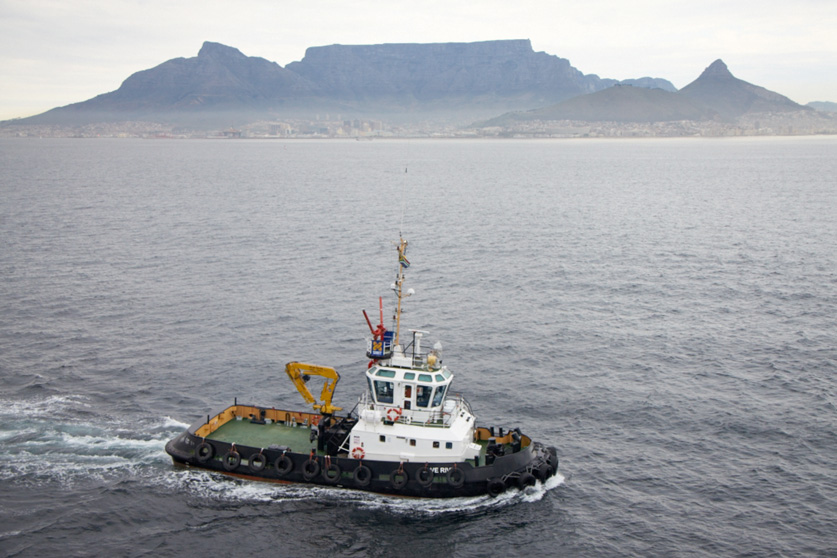
The African Marine Solutions (AMSOL) tug Save River that is used for towage services in Mozambique. The tug was built at the Damen Shipyard in Cape Town. Photograph: African Marine Solutions (AMSOL)
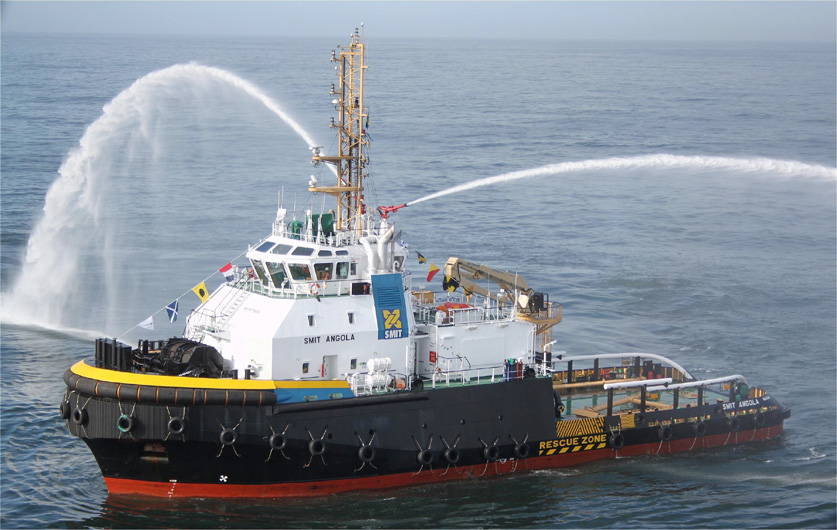
African Marine Solutions (AMSOL) tug: Smit Angola Photograph: African Marine Solutions (AMSOL)
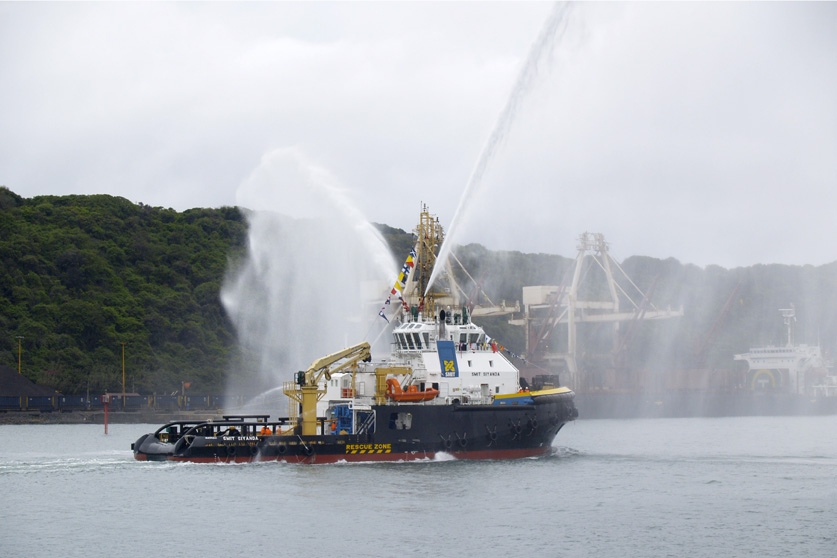
African Marine Solutions (AMSOL) tug: Siyanda Photograph: African Marine Solutions (AMSOL)


